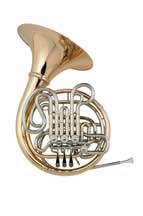|
HORN PAGE OF DANIEL CANARUTTO mathematical physicists and dedicated amateur hornist |
TO MY PROFESSIONAL HOMEPAGE |
|
We had no musician in our family, but my father was a music lover and
handed his passion to me. I was 8 when I attended an opera for the first
time. Eventually we agreed that I would study at the Conservatorio 'L. Cherubini'
of Florence, where I got my degree in horn in the year 1977 (the same
year of my university degree in physics).
When I say "music" I intend classical music (though I am also interested in genuine traditional music). Of course, in order to appreciate it you need a culture and a sensibilty that not many may have. But please, do not mix it with other kinds of "music", produced today for merely commercial reasons! |
|
|
I own two horns: A Kalison M27 (a standard F/Bb double, made around 1970, serial n.2520), which I'm playing in the picture above (as I did for 30 years). A Holton H104 (the Tuckwell model), which I hold in the picture at the left. The horn on the right is a similar model, the H105. |
 |
The main ensemble where I play:
Orchestra Amadeus - Firenze
Thoughts about learning to play, and my own experience.
The horn embouchure is a much more complex issue than the non-player may think, and seems to have kept developing in the last few centuries. Surely today we are well aware of the importance of a correct embouchure; there are several teachers who understand its subtleties and can direct their pupils on the right way. Perhaps in past times it was less so: there were good players with no conscious, thorough understanding of what made their playing succesful. My own experience as a Conservatory student, in the sixties: in the very first day I had a horn in my hands I was given very little indication of what I had to do, then leaved to find the right way myself, by practice & practice; for years I was never corrected, notwithstanding my obvious difficulties. Two subsequent teachers did suggest corrections but to little effect, because (in my opinion) they had no deep understanding of the matter. Eventually I managed, in some warped way, to reach a certain minimum skill, but it was clear that my possibilities were limited (luckily I was a decent physics student and got a job in that field).
For many years I played in amateur ensembles. Organizational and technical difficulties limited my enthusiasm. But eventually I discovered the huge amount of information on the horn available on the internet, and subscribed to the horn mailing-list where real experts are willing to advise. I began to understand a lot more, and in July 99 I decided to re-start everything from the beginning, trying to form a correct embouchure: after less than 4 months, and several adjustments and mini-changes, I felt that no aspects of my playing were worse than before, and some had improved.
In the meantime I began to look for a Really Good Teacher, and was so lucky to find Luca Benucci, principal horn of the Orchestra del Maggio Musicale Fiorentino and one of the best Italian players, who introduced me (starting December 1999) to the fundamental importance of the correct use of air. His competence, his supportive attitude and enthusiasm greatly enforced my determination and wish to play well, at the age of 48! Now I am becoming a completely different player than I was before (the road to excellence being still long).
So I strongly support the view expressed by Verne Reynolds in "The Horn Handbook", on pages 25-26. If you are lucky, you may find the best embouchure and overall setting by yourself, but if you don't, this doesn't mean that you are unable to horn playing (even, maybe, at a high level).
Some thoughts about music and science
One wonders why so many scientists, and in particular theoretical physicists, are deeply interested in music. There are even a few examples of scientists who held dual appointments at a professional level. Among the most famous scientists of this century, Werner Heisenberg was an excellent pianist, while Albert Einstein was a violinist at amateur level.
Often laymen seem to be inclined to think that this is a sort of "compensation": they view science as a dry, cold activity, devoted mostly to complex calculations and handling of horrible-looking formulas. It doesn't occur to them that this is only the "technical" part, closely corresponding to technique in music and any other art. Formulas are the exact counterpart of music notation: if you can't read it, and if you don't understand music, you won't realize that it is just a way (perhaps the most convenient way) of conveying certain ideas.
So, often people do not realize how much of the mathematicians' and theoretical physicists' work is actually creative. These scientsts do not 'discover' things that are already there, just to be picked up with the appropriate techniques/technics. Rather they 'compose', create theories, which must be ultimately be confronted with truth in some way, though truth itself remains an ill-defined concept. Similarly, artistic creations must confront themselves with truth; in this sense, I say that masterpieces are 'discoveries'. I believe that a great part of today's setting of fundamental physical theories is a consequence of history and creativity rather than necessity.
Then I say that music and science are both about the human mind and its relation to the universe. While music is more exclusively about the human mind, physics is only partly such. Music and physics are perhaps partly complementary, but not at all as separate enterprises.
A drawing of me playing made by my daughter